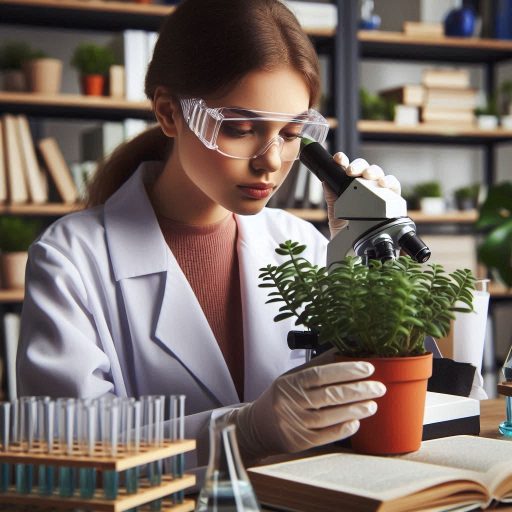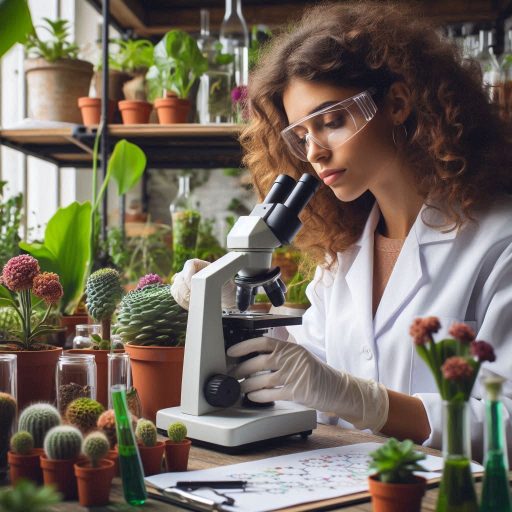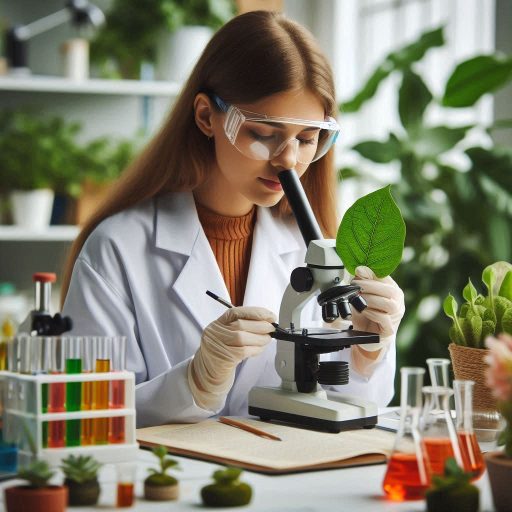Introduction
Plant science is a vital field that focuses on understanding plants and their interactions with the environment.
It encompasses various disciplines, including genetics, biotechnology, and ecology.
Plant scientists play a crucial role in agriculture, horticulture, and environmental conservation.
These professionals contribute to improving crop yields, developing sustainable practices, and ensuring food security.
Their expertise also aids in addressing climate change challenges and promoting biodiversity.
As global populations grow, the demand for skilled plant scientists continues to rise.
Many industries rely on plant scientists for research and innovation.
They work in laboratories, agricultural firms, biotech companies, and government agencies.
These diverse opportunities highlight the importance of plant science in today‘s world.
Several top companies are actively seeking talented plant scientists to drive their research and development efforts.
These organizations prioritize innovation, sustainability, and technological advancements.
In this blog, we will explore the leading companies hiring plant scientists.
We will discuss their focus areas, career opportunities, and what makes them attractive workplaces for aspiring professionals.
Understanding these options can help you make informed decisions about your future in plant science.
Bayer Crop Science
Description of the Company and Its Focus on Agriculture
Bayer Crop Science stands out as a global leader in agriculture.
The company focuses on innovative solutions to enhance crop yield and sustainability.
With operations in over 120 countries, Bayer Crop Science addresses the challenges of food security.
They combine advanced technologies with agricultural expertise to develop products that benefit farmers worldwide.
Opportunities for Plant Scientists Within the Company
Plant scientists play a vital role at Bayer Crop Science.
The company seeks experts to work on crop protection, biotechnology, and sustainable agriculture.
These scientists contribute to research and development, focusing on creating high-quality seeds and crop protection products.
Opportunities exist in various areas, including plant breeding, molecular biology, and environmental science.
Bayer Crop Science offers a dynamic work environment that fosters innovation and collaboration.
The company invests heavily in research and development, encouraging employees to push boundaries.
Plant scientists collaborate with cross-functional teams to bring new solutions to market.
This teamwork cultivates a culture of learning and growth.
Testimonials from Current or Past Plant Scientists Working at Bayer Crop Science
Current and past employees often highlight the positive work culture at Bayer Crop Science.
Many plant scientists appreciate the company‘s commitment to professional development.
They enjoy access to ongoing training and opportunities to attend conferences and workshops.
These resources enable scientists to stay current with industry trends and advancements.
One plant scientist shared, ‘Working at Bayer has been transformative for my career.
I appreciate the support for research and the focus on sustainability.‘
Another scientist emphasized the collaborative environment, stating, ‘My colleagues inspire me every day.
We tackle complex challenges together, making a real impact in agriculture.‘
Bayer Crop Science also emphasizes work-life balance.
Employees often report satisfaction with flexible work arrangements and a supportive atmosphere.
This balance allows plant scientists to pursue personal interests while contributing to significant agricultural advancements.
The company‘s strong commitment to sustainability aligns with the values of many scientists.
Bayer Crop Science actively seeks to develop solutions that minimize environmental impact.
This focus attracts plant scientists passionate about making a difference in agriculture and the planet.
Bayer Crop Science offers numerous opportunities for plant scientists.
The company‘s dedication to innovation, sustainability, and professional growth makes it an attractive employer.
Read: Profiles in Success: Leading Chemists of the 21st Century in the US
Syngenta
Overview of Syngenta’s Research and Development in Plant Science
Syngenta is a global leader in agriculture, dedicated to innovative research and development in plant science.
The company focuses on developing sustainable solutions for farmers.
Their mission is to improve crop productivity while minimizing environmental impact.
Syngenta invests significantly in R&D to create advanced agricultural technologies.
The company specializes in crop protection and seed development.
They utilize cutting-edge biotechnology to enhance plant health and yield.
Syngenta conducts extensive research on pest resistance, disease control, and soil health.
Their scientists work on developing new traits to improve crops under changing climate conditions.
Syngenta collaborates with academic institutions and industry partners to advance plant science.
This collaboration fosters innovation and drives the development of new agricultural solutions.
Their research programs address critical challenges facing farmers today, including food security and sustainability.
Recruitment Process for Plant Scientists at Syngenta
The recruitment process at Syngenta for plant scientists is thorough and competitive.
Candidates typically apply online through the Syngenta careers page.
The process includes an initial screening of resumes and cover letters.
Selected candidates undergo interviews to assess their technical expertise and fit within the company culture.
Syngenta values diversity and seeks candidates from various backgrounds.
They look for individuals with strong analytical skills and a passion for plant science.
Collaboration and communication skills are also essential, as plant scientists work in cross-functional teams.
Candidates may participate in assessments or technical interviews to demonstrate their knowledge.
Syngenta encourages candidates to showcase their research experience and problem-solving abilities.
Successful applicants often possess advanced degrees in plant science or related fields.
The company prioritizes hiring individuals committed to innovation and sustainability in agriculture.
Benefits and Perks Offered to Plant Scientists at Syngenta
Syngenta offers a competitive benefits package to attract top talent in plant science.
Employees receive health, dental, and vision insurance for their well-being.
The company provides a robust retirement plan to support long-term financial security.
In addition to standard benefits, Syngenta promotes work-life balance.
They offer flexible working arrangements to accommodate personal and professional needs.
Employees can participate in wellness programs and fitness initiatives to promote a healthy lifestyle.
Professional development is a key focus at Syngenta.
The company invests in training and educational opportunities for its scientists.
Employees have access to workshops, conferences, and online courses to enhance their skills.
This commitment to ongoing learning helps plant scientists stay current in their field.
Syngenta also fosters a collaborative and inclusive workplace culture.
Employees often highlight the supportive environment that encourages teamwork and innovation.
This culture allows plant scientists to thrive and contribute to meaningful agricultural advancements.
Syngenta is a leading employer for plant scientists.
Their commitment to research, competitive recruitment process, and comprehensive benefits make them an attractive choice.
By fostering innovation and providing support, Syngenta empowers plant scientists to make a significant impact in agriculture.
Read: The Life and Times of a U.S. Physicist: A Day in Detail
Corteva Agriscience
Global Presence of Corteva Agriscience and Its Impact on Plant Science
Corteva Agriscience operates globally, focusing on sustainable agriculture and innovative plant science.
The company emerged from the merger of Dow AgroSciences and DuPont.
This merger brought together extensive expertise and resources in agricultural research.
Corteva serves farmers in over 140 countries, addressing diverse agricultural challenges worldwide.
The company‘s global presence enhances its ability to conduct extensive research.
They develop solutions tailored to different environmental conditions and regional agricultural practices.
This localized approach allows Corteva to create effective products for various crops and climates.
Corteva prioritizes innovation in plant science.
They invest heavily in research and development to improve crop yields and resilience.
Their research focuses on plant genetics, pest management, and soil health.
Corteva’s scientists work diligently to develop sustainable agricultural practices that benefit farmers and the environment.
Collaboration Opportunities for Plant Scientists at Corteva Agriscience
Corteva Agriscience fosters a collaborative environment for plant scientists.
The company encourages partnerships with academic institutions and research organizations.
These collaborations enhance research capabilities and drive innovation in plant science.
Plant scientists at Corteva often work in cross-functional teams.
This collaboration facilitates the exchange of ideas and expertise.
Team members come from various backgrounds, including agronomy, biotechnology, and data science.
This diversity fosters creativity and enhances problem-solving.
Corteva also engages in open innovation initiatives.
They seek external partnerships to leverage new technologies and research findings.
This commitment to collaboration positions Corteva at the forefront of agricultural advancements.
Plant scientists can contribute to impactful projects that shape the future of agriculture.
How Corteva Agriscience Supports Career Growth for Plant Scientists
Corteva Agriscience is dedicated to the professional development of its plant scientists.
The company offers numerous training and development programs.
Employees can access workshops, seminars, and online courses to enhance their skills.
This commitment to ongoing education helps plant scientists stay current with industry trends.
Corteva promotes internal mobility, allowing scientists to explore different roles within the organization.
This flexibility enables employees to broaden their expertise and career horizons.
The company encourages employees to pursue leadership opportunities and mentorship programs.
Corteva also recognizes and rewards employee achievements.
They offer performance-based incentives and bonuses to motivate their workforce.
This recognition fosters a positive work environment and encourages innovation.
Corteva Agriscience is a prominent player in plant science with a global presence.
Their collaborative culture provides ample opportunities for plant scientists.
With strong support for career growth, Corteva empowers its employees to thrive and contribute to sustainable agriculture.
By prioritizing innovation and collaboration, Corteva Agriscience continues to shape the future of agriculture.
Read: Salary Ranges: What to Expect as a Physicist in the USA

BASF
Innovative Projects in Plant Science at BASF
BASF is a global leader in chemical solutions, focusing significantly on innovative plant science.
The company develops sustainable agricultural solutions that enhance crop productivity and resilience.
Their research targets various aspects of plant health, including genetics, pest resistance, and nutrient efficiency.
BASF invests heavily in cutting-edge technologies.
These technologies include biotechnology and digital agriculture, which revolutionize traditional farming practices.
For instance, BASF employs advanced breeding techniques to create high-yield and disease-resistant crop varieties.
This innovation helps farmers produce more food sustainably and efficiently.
Additionally, BASF emphasizes the importance of sustainability.
They work on projects aimed at reducing chemical usage and enhancing soil health.
By developing integrated pest management strategies, BASF supports farmers in maintaining ecological balance while protecting their crops.
Their commitment to innovation positions BASF as a driving force in the future of agriculture.
Internship Programs for Aspiring Plant Scientists
BASF offers robust internship programs for aspiring plant scientists.
These internships provide valuable hands-on experience in various aspects of agricultural research.
Interns work alongside experienced professionals on real-world projects, gaining practical insights into plant science.
The internship program fosters skill development and professional growth.
Interns receive mentorship and guidance from industry experts.
This mentorship helps them understand the challenges and opportunities within the field of plant science.
Moreover, BASF actively recruits interns for potential full-time positions.
Many former interns transition into full-time roles after graduation.
This pathway allows interns to establish their careers with a reputable company.
Pathways for Advancement Within the Company for Plant Scientists
BASF promotes a culture of continuous learning and career advancement for plant scientists.
The company offers various development programs to enhance employees’ skills and knowledge.
These programs cover topics like leadership, technical expertise, and project management.
Plant scientists at BASF have access to numerous career pathways.
They can explore roles in research and development, regulatory affairs, or marketing.
This diversity allows employees to align their career goals with their interests and strengths.
BASF encourages internal mobility, enabling employees to transition between departments.
This flexibility helps plant scientists gain diverse experiences and broaden their expertise.
The company values employee growth, offering performance-based promotions and recognition.
Additionally, BASF fosters a collaborative work environment.
Teams frequently collaborate on projects, allowing employees to learn from one another.
This teamwork enhances creativity and drives innovation in plant science.
BASF is a leader in innovative plant science projects, committed to sustainability and agricultural advancement.
Their internship programs provide aspiring plant scientists with essential experience and networking opportunities.
With multiple pathways for career advancement, BASF empowers its employees to thrive and contribute significantly to the field of plant science.
Read: Physics Specializations: Choosing Your Path in the U.S.
Monsanto
Focus on Sustainability and Environmental Conservation at Monsanto
Monsanto, now part of Bayer, has a strong commitment to sustainability and environmental conservation.
The company aims to develop agricultural solutions that benefit farmers while protecting natural resources.
Monsanto emphasizes sustainable farming practices, helping farmers produce food efficiently.
Monsanto invests in research to create environmentally friendly technologies.
Their focus includes developing crops that require fewer inputs, such as water and fertilizers.
These innovations support sustainable agriculture and reduce the ecological footprint of farming.
The company’s initiatives also include improving soil health and biodiversity.
Monsanto’s programs encourage farmers to adopt practices that enhance soil quality and promote ecosystem balance.
By prioritizing sustainability, Monsanto contributes to long-term food security and environmental preservation.
Transform Your Career Today
Unlock a personalized career strategy that drives real results. Get tailored advice and a roadmap designed just for you.
Start NowInvolvement of Plant Scientists in Research and Development Projects
Plant scientists play a crucial role in Monsanto’s research and development efforts.
They work on developing genetically modified organisms (GMOs) that offer pest resistance and increased yields.
This research helps farmers grow more resilient crops in changing climates.
Additionally, plant scientists at Monsanto engage in extensive field trials.
These trials evaluate the performance of new varieties under various environmental conditions.
This hands-on research ensures that innovations meet farmers’ needs effectively.
Monsanto fosters collaboration among its scientists.
Researchers frequently collaborate with agronomists and environmental scientists.
This interdisciplinary approach drives innovation and leads to more comprehensive solutions for agricultural challenges.
The company also encourages professional development for its plant scientists.
They have access to ongoing training and educational opportunities.
This commitment to growth ensures that scientists stay updated with the latest advancements in plant science.
Company Culture and Values that Attract Plant Scientists to Work There
Monsanto cultivates a company culture that values innovation, collaboration, and diversity.
Employees work in a supportive environment that encourages creative thinking.
This culture attracts top talent in the field of plant science.
The company’s values emphasize integrity, transparency, and accountability.
Monsanto prioritizes ethical practices in its research and business operations.
This commitment resonates with plant scientists who seek to make a positive impact in agriculture.
Additionally, Monsanto promotes work-life balance and employee well-being.
The company provides flexible work arrangements and wellness programs.
This focus on employee satisfaction contributes to a positive work environment.
Moreover, Monsanto actively engages with local communities.
The company invests in initiatives that support sustainable agriculture and education.
This community involvement aligns with the values of many plant scientists who want to contribute positively to society.
Monsanto’s focus on sustainability, involvement of plant scientists in research, and supportive company culture make it an attractive employer.
Their commitment to environmental conservation and innovative agricultural solutions drives the company forward.
By fostering a collaborative and ethical work environment, Monsanto continues to attract and retain talented plant scientists.
The Scotts Miracle-Gro Company
Leadership in Biotechnology and Genetic Engineering in Plant Science
The Scotts Miracle-Gro Company is a leader in biotechnology and genetic engineering within plant science.
They focus on developing innovative solutions for lawn and garden care.
Their research enhances plant growth and resilience while addressing environmental concerns.
Scotts Miracle-Gro invests heavily in research and development.
The company aims to create genetically modified plants that thrive under various conditions.
This research enhances crop yields and improves plant health, benefiting both consumers and the environment.
The company collaborates with universities and research institutions.
These partnerships help Scotts Miracle-Gro stay at the forefront of plant science innovations.
This collaborative approach fuels advancements in biotechnology and genetic engineering.
Cutting-Edge Technologies Used by Plant Scientists at The Scotts Miracle-Gro Company
Plant scientists at Scotts Miracle-Gro utilize cutting-edge technologies to enhance their research efforts.
They employ advanced genetic engineering techniques, such as CRISPR and genome editing.
These tools enable scientists to develop plants with desirable traits efficiently.
Additionally, the company uses sophisticated data analytics to drive research decisions.
This data-driven approach ensures that scientific findings translate into practical solutions for consumers.
By leveraging technology, Scotts Miracle-Gro optimizes plant performance and growth.
Moreover, the company invests in precision agriculture technologies.
These technologies include soil sensors and drones for monitoring plant health.
Plant scientists use these tools to assess environmental conditions and optimize resource usage.
Scotts Miracle-Gro also emphasizes sustainable practices in its research.
Their innovations focus on reducing chemical inputs while maximizing plant growth.
This commitment to sustainability aligns with the growing demand for environmentally friendly products.
Training and Development Opportunities for Plant Scientists
The Scotts Miracle-Gro Company prioritizes training and development for its plant scientists.
They offer comprehensive onboarding programs for new employees.
This training ensures that scientists are well-versed in company values and research goals.
Ongoing education is a key aspect of professional development at Scotts Miracle-Gro.
The company provides access to workshops, seminars, and conferences.
These opportunities help scientists stay updated on the latest advancements in plant science.
Additionally, Scotts Miracle-Gro encourages collaboration among its scientists.
Cross-functional teams work together to tackle complex challenges in plant research.
This collaborative environment fosters innovation and promotes knowledge sharing.
The company also supports higher education for its employees.
They offer tuition reimbursement for courses related to plant science and biotechnology.
This investment in education strengthens the company‘s talent pool and enhances its research capabilities.
The Scotts Miracle-Gro Company leads the way in biotechnology and genetic engineering.
Their cutting-edge technologies drive research advancements while their commitment to training fosters professional growth.
By investing in their plant scientists, Scotts Miracle-Gro continues to innovate and meet the needs of consumers in the gardening and landscaping markets.
Explore Further: Nuclear Science and Environmental Impact
J.R. Simplot Company
Unique Projects or Initiatives in Plant Science at J. R. Simplot Company
The J. R. Simplot Company is known for its innovative projects in plant science.
They focus on enhancing crop production and sustainability.
One notable initiative is their research on potato genetics.
The company aims to develop disease-resistant potato varieties, improving yields and reducing pesticide use.
Simplot collaborates with universities and research institutions on various projects.
These partnerships drive advancements in agricultural practices and technology.
They explore soil health, irrigation efficiency, and crop resilience to climate change.
Additionally, Simplot invests in precision agriculture technologies.
They utilize data analytics to optimize farming practices.
This approach enhances decision-making and boosts productivity for farmers.
The company also emphasizes sustainable practices in its research.
They strive to minimize environmental impacts while maximizing agricultural output.
This commitment aligns with consumer demands for environmentally friendly products.
Work-Life Balance and Flexibility for Plant Scientists
J. R. Simplot Company prioritizes work-life balance for its employees.
They understand the importance of flexible schedules in attracting top talent.
This flexibility allows plant scientists to manage their professional and personal lives effectively.
The company offers remote work options when possible.
This adaptability helps employees maintain productivity while accommodating their needs.
The emphasis on work-life balance fosters a positive workplace culture.
Moreover, Simplot encourages a collaborative environment.
Plant scientists often work in teams, promoting a sense of community.
This teamwork enhances job satisfaction and encourages knowledge sharing among colleagues.
Employee Retention Strategies That Make J. R. Simplot Company a Desirable Place for Plant Scientists to Work
J. R. Simplot Company employs various strategies to retain its workforce.
They offer competitive salaries and comprehensive benefits packages.
This commitment to employee welfare helps attract and keep talented plant scientists.
The company invests in professional development opportunities.
Employees can attend workshops, conferences, and training sessions.
This focus on continuous learning supports career growth and enhances job satisfaction.
Furthermore, Simplot values employee feedback and engagement.
They regularly conduct surveys to gauge employee satisfaction.
This open communication fosters a positive work environment and addresses any concerns.
The company also celebrates employee achievements and milestones.
Recognizing contributions boosts morale and strengthens employee loyalty.
By promoting a culture of appreciation, Simplot enhances employee retention.
The J. R. Simplot Company excels in plant science innovation.
Their unique projects, commitment to work-life balance, and effective employee retention strategies make them a desirable workplace.
By fostering a supportive environment, Simplot continues to attract and retain talented plant scientists dedicated to advancing agricultural practices.
Conclusion
Many top companies hire plant scientists, providing exciting career opportunities.
Bayer Crop Science, Syngenta, Corteva Agriscience, and BASF lead the industry.
These companies focus on innovation, sustainability, and research, attracting skilled professionals.
Aspiring plant scientists should research these organizations thoroughly.
Each company offers unique projects, benefits, and work environments.
Finding the right fit is crucial for long-term career success.
Consider factors like company culture, career advancement opportunities, and work-life balance.
Aligning personal values with a company’s mission enhances job satisfaction.
Networking with professionals in the industry can provide valuable insights.
Attend conferences, join professional organizations, and engage on social media.
Building connections can lead to job opportunities and mentorship.
Additionally, stay informed about emerging trends in plant science.
This knowledge will help you stand out as a candidate.
Be proactive in seeking continuous education and professional development.
Ultimately, choosing the right company to work for significantly impacts your career trajectory.
Take the time to explore options and make informed decisions.
Your future as a plant scientist depends on finding the right fit that supports your growth and goals.
[E-Books for Sale]
The Big Book of 500 High-Paying Jobs in America: Unlock Your Earning Potential
$19.99 • 500 High-Paying Jobs • 330 pages
Explore 500 high-paying jobs in America and learn how to boost your career, earn more, and achieve success!
See All 500 High-Paying Jobs of this E-Book
1001 Professions Without a Degree: High-Paying American Jobs You Can Start Now
$19.99 • 1001 Professions Without a Degree • 174 pages
Discover 1001 high-paying jobs without a degree! Unlock career tips, skills, and success strategies for just $19.99!




